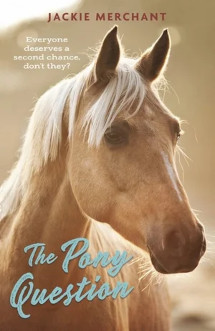The pony question by Jackie Merchant

Walker Books, 2020. ISBN: 9781760651640. 255pp.
(Ages: 9 -13) Recommended. Twelve-year-old Essie lives a modest life
with her mother Francesca in an Australian country town. They
resettled there from the city after her father 'Shiny Steve'
remarried. Essie is still recovering from glandular fever and
feeling rather unloved by her father. Francesca restores old
furniture for a living and this takes them to a clearance sale on a
farm. They accidentally purchase a pony on its last legs. In her
past life Essie was a successful winner of dressage events. However
her father drugged her horse because it had injuries when he wanted
Essie to go in the dressage finals. He was caught and this caused
Essie to be banned from competitions. Essie's reputation was ruined
and social media helped spread the message. As the new pony, Moxie,
recovers with Essie's care it also develops some difficult
behaviours but they also learn it had a successful past. Essie
believes Moxie needs to be retrained but this is expensive. Her
father has moved to Germany and offers little help, although he was
once her mainstay. Fortunately Essie's friend and neighbours make up
for it. Francesca has much sage advice, which helps Essie but as her
self-confidence grows, she makes her own decisions.
This is a well-paced hopeful story. It is not just about a girl
obsessed with horses, although the author's knowledge clearly adds
to the believability. It is more nuanced than that, which makes it
quite satisfying. The setting is well imagined and the characters
all have their own interesting personalities. You feel it would be
terrific to be part of this caring community. Essie is a very
likeable girl with understandable self-doubts, a sharp assessor of
other people's characters, yet considerate and with good values.
Like Moxie, Essie is also getting a second chance at success as she
becomes a teenager. The author weaves in values of appreciating what
you have and calling out artificiality. In particular sustainable
practices of reusing and remaking things is juxtaposed with our
plastic throw-away society.
Jo Marshall